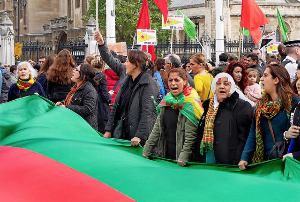What the Columnists Say
Fatih Yaşlı in Yurt writes that the evacuation of the Süleyman Şah tomb in Syria symbolizes the end of the neo-Ottoman project of the AKP regime. İbrahim Karagül in Yeni Şafak sees a foreign hand behind ISIS and argues that the operation that evacuated the Turkish soldiers thwarted the designs of foreign powers that were scheming to attack Turkish interests under the guise of ISIS. Etyen Mahçupyan in Akşam writes that Recep Tayyip Erdoğan is not an authoritarian, but that he behaves like that only when he feels under threat. Mahçupyan urges the opposition to create the conditions that will enable Erdoğan to be a democrat. Bülent Korucu in Zaman detects signs that a closure case against the main opposition party CHP may be under way. Ali Bulaç in Zaman writes that the AKP has destroyed Islamism and forfeited a century-old heritage.

What the Columnists Say
The fact that the military has returned to playing a political role in the wake of the Kobane events, with the General Staff making several emotionally charged statements on the Kurdish issue, has started to be noted with growing alarm by some commentators. Ali Bayramoğlu in Yeni Şafak warns that in a country with Turkey’s history, its political culture, with its deep societal divisions and with ongoing regional developments, the door is not closed to a return of the military. He notes that the Kurdish issue is of critical importance and reminds that what prompted the military return to politics in the 1990s was precisely the Kurdish issue. Other commentators worry about the consequences of regional developments. While pro-government pundits accuse the United States of harboring imperialist designs against Turkey, critics of the government charge that it invites severe troubles by its ideologically motivated refusal to dissociate itself from what ISIS stands for.

Turkey Moves Toward a Grand Bargain with Kurdistan
By Micha’el Tanchum (vol. 7, no. 19 of the Turkey Analyst)
On October 20, Turkey’s foreign minister Mevlut Çavuşoğlu announced that “Peshmerga” fighters from the Iraqi Kurdish Regional Government (KRG) are going to be allowed to transit Turkish territory to reinforce the beleaguered Kurdish forces of the Democratic Union Party (PYD) defending the Syrian Kurdish town of Kobane against the Islamic State of Iraq and al-Sham (ISIS.) The Turkish government had previously turned down requests for it to open a land corridor. Turkey’s policy u-turn means that it now has a unique opportunity to rehabilitate its failed Kurdish policy and arrive at a grand bargain to secure its national interests along its borders with Syria and Iraq. To create a more amenable constellation of Kurdish political allies, the Turkish government will need to offer a meaningful accommodation of Kurdish demands within Turkey.

What the Columnists Say
Several columnists express concern over Turkey’s future after the violent clashes in the Kurdish parts of the country and the government’s reaction to them. Cengiz Çandar writes that the leadership of the country has not learnt the right lessons and that it is mistaken in thinking that police state methods are going to save the day. Yetvart Danzikyan warns that the methods of the AKP government are inflaming ethnic and sectarian tensions and that the situation could get out of hand. Abdülkadir Selvi writes that Turkey is not going to give in to the pressures of the United States regarding the use of its bases in the fight against ISIS and reminds that Turkey demands that the Sunnis in Syria and Iraq are empowered and that the Assad regime in Syria is removed from power.

Yesterday's Wars: The Cause and Consequences of Turkish Inaction Against the Islamic State
By Gareth Jenkins (vol. 7, no. 18 of the Turkey Analyst)
On October 7, 2014, Turkey was swept by some of the most violent civil unrest in a generation. At least 23 people were killed and hundreds injured in an eruption of Kurdish nationalist anger at Ankara’s perceived indifference to the apparently imminent capture by the Islamic State of the predominantly Kurdish Syrian border town of Kobane.








